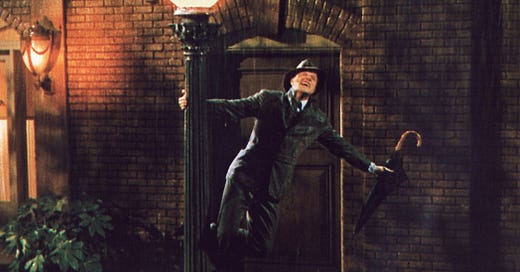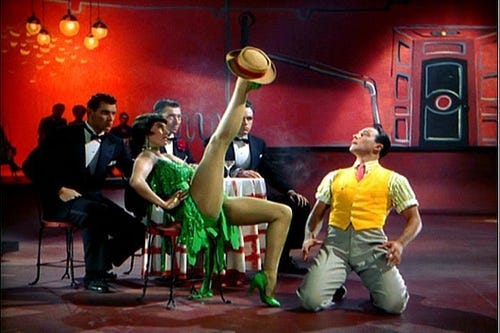FRIENDOS, I hate musicals. I simply lack the imagination to suspend disbelief sufficiently to buy that a group of people will just elect to express themselves via song and dance1. Add in the fact that the style of music generally found in musicals—you know, Musical Music—isn’t my cup of tea, and it’s exceedingly rare that a musical will break through and win me over. Which I think we can all acknowledge should be the main goal of any entertainment: Acquiring the very desirable Jeff Somers stamp of approval2.
Exceedingly rare, but not unheard of. There is a short list of musicals that I actually enjoy, and at the top of that list is Singin’ in the Rain, the 1952 musical starring Gene Kelly, Donald O’Connor, and Debbie Reynolds. The fact that I love this movie is weird on several dozen levels. First of all, musical. Second of all, it’s a 1950s period piece set in the 1920s, and I’m more or less unfamiliar with the work of everyone involved outside of this film3. Plus, the film was created as a cynical vehicle to monetize a bunch of old songs the studio had lying around. How in the world this film broke through my cool exterior remains a mystery, but it did and it remains embedded in my blackened, shriveled heart4.
One reason for that may be the fact that Singin’ in the Rain is delightfully cynical, which strums my heartstrings. It’s also a movie filled with actors with the hearts of grifters spinning tall tales about their origins, mean-spirited people mocking each other, and a plot that pivots off taking advantage of a spectacularly stupid person5. I love it!
Finally, Singin’ in the Rain is a prime example of genre fluidity, because the film is a musical shell wrapped around what is essentially a thriller: Singin’ in the Rain is a heist movie.
Stealing My Heart
It’s easy to make the mistake of thinking that genre is a fixed concept—that thrillers always look and feel like thrillers, or romances always look and feel like romances. Most people are comfortable with the idea of mixing genres to a certain extent—the romantic subplot, the murder mystery with a deep bench of comedy—but we generally expect certain genres to adhere to certain tone frequencies and pacing requirements.
But genres can masquerade as each other, and Singin’ in the Rain is a prime example. Sure, it’s a musical, and a romantic comedy on top of that. It hits all those beats, but it’s all a smokescreen for the real structure of the story, which is 100 percent heist. Or, since technically nothing is stolen (aside from my blackened, underdeveloped heart6) maybe the word caper is a better fit. Either way, it adheres to the basic stages of a heist/caper story:
1. The identification of an impossible task
2. The assembly of a team
3. The development of a complex scheme using the individual talents of that team
4. Sudden twist adding complexity
5. Apparent failure
6. Apparent failure revealed as actual triumph7
If you’re unfamiliar with the plot of the film, here’s the quick and dirty version: In the waning days of silent movies, megastars Don Lockwood (Gene Kelly) and Lina Lamont (Jean Haberg) have just completed their latest film, The Dueling Cavalier. When informed that silent films are no longer viable, they face the end of their careers, so they agree to reshoot the movie as a talkie. This is fine for Don, who speaks like a normal human being, but more of a challenge for Lina, who has a voice that sounds like a frog from Brooklyn. The test screening is a dismal failure, so Don’s friend Cosmo hits on another idea: Turn it into a musical and get Don’s new girlfriend, Kathy Selden (Debbie Reynolds) to sing and record Lina’s lines. When the film’s a smash, Lina tries to force Kathy to be her “voice” in perpetuity, so Don, Cosmo, and the studio chief R.F. expose Lina in humiliating fashion. After the debacle, Don and Kathy go on to be the next big film couple.
That, my friends is a caper. They’re faced with an impossible task (make Lina sound good in a movie), they assemble a team (granted, it’s really just Cosmo and then getting Kathy and their studio boss, R.F., to go along) they use their talents to pull off a complex scheme, then just as it seems like everything has gone sideways, they reveal they’ve actually won. Sure, it’s all wrapped up in candy-colored musical wrapping, but the story beats (excluding the bizarre musical number somehow set in the 1950s8) all line up perfectly, right to the moment at the end when the audience thinks our heroes have been stymied by Kathy Selden’s apparently airtight contract, only to discover it’s a false cadence: The heroes win, after all, and sacrifice nothing to do so. Just like in any heist story, they have to lose in order to win.
Moses Supposes Erroneously
For someone just looking to enjoy Gene Kelly in his water-resistant suit dancing to the title song, of course, this is an unnecessary thought exercise9. But if you’re trying to figure out why this musical works so well, understanding its underlying energy is important. This mixing of genres grants Singin’ in the Rain a complex energy; where most musicals simply tell a story in a pretty straightforward way, punctuating story beats with song-and-dance numbers, Singin’ in the Rain instead rushes along with an air of emergency as the gang faces endless obstacles to overcome, completely belying the fact that these are wealthy, privileged people scheming to remain wealthy and privileged10.
Stories that play these kinds of tricks work well because they confuse our underbrains. We see singing and dancing, we see a moderately age-inappropriate romance11, and our subconscious brains set us up to expect certain things. When the story actually becomes a caper, with the will-they-can-they aspect of Don and Kathy’s relationship backgrounded (and really the script does almost zero work to make us ever believe those crazy kids won’t be together at the end) it’s a subliminal kind of dissonance. Visually you’re still getting “musical romantic comedy,” but in every other way you’re getting Ocean’s 11.
Now that you know my dirty secret that I love Singin’ in the Rain, you are contractually required to send me your own most terrifying secret. I don’t make the rules.
Next: The Prisoner and making your audience angry.
This despite the fact that my #1 favorite thing to do whenever I’m alone is to have a literal conversation with myself.
So far a mere forty billion movies, songs, books, and TV shows have received this erudite blessing.
Also, not for nothing, but the men’s pants in this film are so aggressively high-waisted it distracts me every time I watch it.
I actually sing a version of “Good Morning, Good Morning” to my cats every day when I wake up. Shut up.
Additionally: A character is named Cosmo. This improves all narratives. Try it in your next story and tell me I’m lying.
Here is where I admit that the list of movies that make me cry unmanly, blubbery tears is surprisingly and disturbingly long, and yes it includes Field of Dreams because of the moment when Ray has a catch with his Dad. Happy now?
By this definition, of course, every time my friends have to try to get me home after a night of carousing technically counts as a caper. Also: “Apparent Failure Revealed as Actual Triumph” will definitely be the title of my memoir.
To be fair, seeing Cyd Charisse in this sequence catapulted me directly into puberty.
Unnecessary Thought Exercise is, of course, the name of my rock band.
As Americans, we will die to defend your right to remain wealthy and privileged. Usually literally.
JEBUS, Debbie Reynolds was 19 in this. Gene Kelly was 40. Not exactly monstrous, but still … creepy.







Nice piece of writing Jeff.
Jeff, we all know your friends (or should I say “friends”?) leave you unconscious behind a dumpster, though of course this does qualify as Apparent Failure Revealed as Actual Triumph.